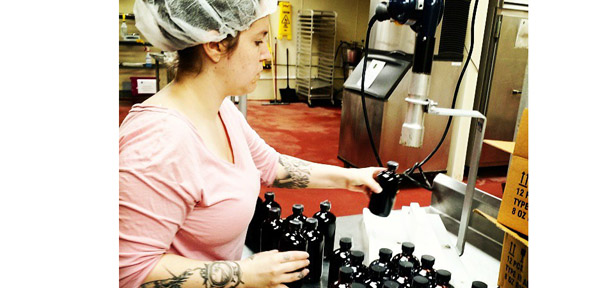
A new kitchen and partnership could take more entrepreneurs to market and success
With a $50,000 grant in hand and a new partnership with Our Lady of Holy Cross College, the Edible Enterprises farm-to-market mission is shifting into higher gear.
Growth is prompting the development of a third FDA-approved, commercial grade kitchen in the food business incubator in Norco.
“We don’t think it’s going to be any problem to have users utilize that space,” said Corey Faucheux, director of the St. Charles Parish Department of Economic Development and Tourism. Faucheux said they’ve also had inquiries about the third kitchen. “We just decided it was time. The demand was there and that was the main driver for this.”
The 10,000-square-foot incubator opened the doors in 2009 by Faucheux’s office and supported by the Norco Community Economic Development Foundation, Greater New Orleans Foundation, as well as the parish government, Shell and Motiva. The parish government owns the property and incubator, which started with two furnished kitchens and space for a third.
At the time of the food incubator’s opening, it was the only one of its kind in Louisiana, but LSU has since opened one in Baton Rouge, Faucheux said. However, the Norco location remains the largest one of its kind in the Southeast.
The New Orleans Food & Farm Network (NOFFN), which focuses on “urban ag space” or creating farms in empty lots in New Orleans, was brought in to handle day-to-day operations.Faucheux said the nonprofit organization’s network throughout South Louisiana is helping create a pipeline of growers who want to use the incubator to jump start a food business with locally grown fruit and vegetables.
“If you have a family recipe, you can come into Edible Enterprises and make it, process it and go out and try to sell it,” he said. “Now is your chance to do it.”
The newly inked partnership agreement with Our Lady of Holy Cross College is a mutually beneficial arrangement.
Students with the college’s food science program will help the incubator startups with food testing products, instructing on proper processes to get the products on the shelf and with food safety overall.
“With a lot of users, all they have is a great idea or recipe,” Faucheux said. “They don’t quite have the knowledge or know how to make that great recipe into a great business.”
The incubator has six to seven regulars (individuals and businesses) using the facility’s kitchens with some occasional users on holidays. Another four to five prospects are undergoing the permitting process with the Louisiana Department of Health & Hospitals to be able to handle food for public distribution.
Proposals to complete the third kitchen, about 1,000 square feet, will be taken this month, Faucheux said. A company will be chosen to do the job and work targeted for completion by end of this year.
NOFFN Director Sonjay Kharod said the planned state-of-the-art kitchen and partnership is part of his organization’s plan to use the third kitchen as a pilot facility to “make new and better products.”
They also want to help grow startup businesses from making a batch of hundreds to thousands of product.
“We can help people think through their products and that’s really exciting,” said Kharod, pointing to the combined boost from the Holy Cross partnership and. “We’re going to try to incubate for value-added processing.”
The program, which he said they hope to start later year, would entail bagging greens or strawberries in season to sell out of season, he said.
“We’re essentially creating a greater market for all the farmers around us,” Kharod said. “The goal is to increase the availability of local food, rather than having an expensive hobby.”
For the last five years, NOFFN has also worked to help better connect growers to markets, such as selling frozen bagged vegetables in quantities appealing to larger buyers like school systems and Walmart.
“We’re trying to marry the capabilities of the kitchen with what’s being produced and get it to market,” Kharod said. “That way, farmers can do what they do best and we can help them earn more income to grow.”
Edible Enterprises also is focusing on innovative projects, beyond those like the standard barbecue sauce, to artisanal foods.
An example of a successful venture is The Big Easy ‘Bucha, which Kharod said brews kombucha, a fermented, lightly effervescent sweetened black or green tea with health benefits. The products are planned to hit Whole Foods Market shelves next month.
The couple who started the business are going full tilt on reaching the market.
According to Faucheux, that’s exactly what the food incubator is about.
“We need as many people as possible to know about it,” he said. “Once you get past the startup costs, it’s really inexpensive to use the kitchen. We try to grow this economy, where you combine with all the farmer markets, and it seems to be doing quite well.”




Be the first to comment